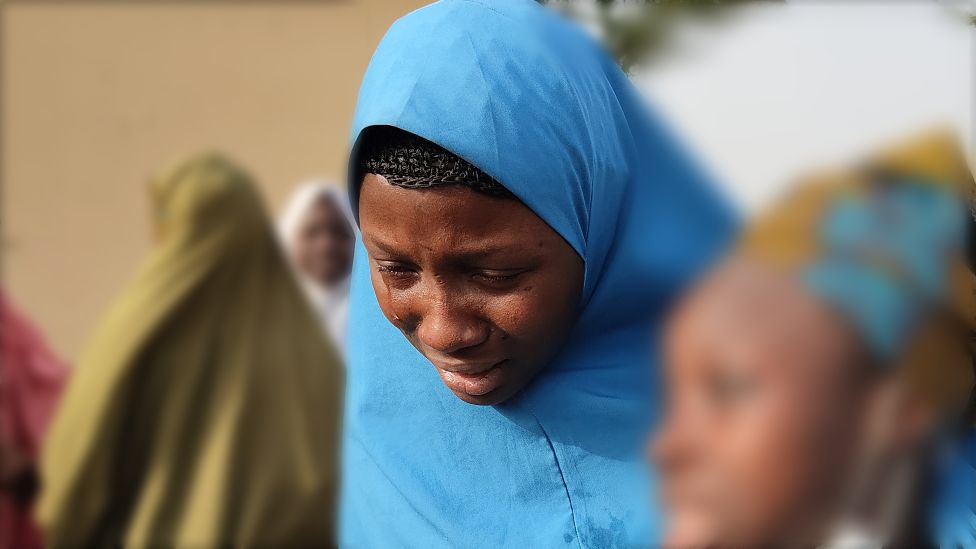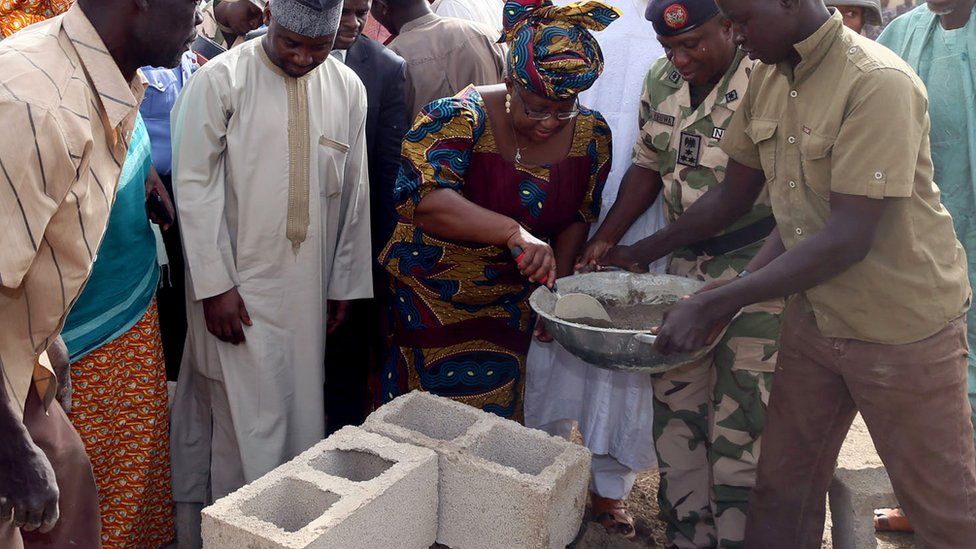
The kidnapping of hundreds of Nigerian schoolgirls from Chibok seven years ago led to the launching of a multi-million dollar plan, backed by a former UK prime minister, to bolster security at schools - but it failed to stop abductions and protect children.
The swirl of dust thrown up as a helicopter came down to land heralded a high-level visit to Chibok in March 2015.
Ngozi Okonjo-Iweala, Nigeria's finance minister at the time and now head of the World Trade Organization, was received by a waiting crowd of community leaders and parents whose daughters had been kidnapped.
She was in Chibok to lay the first bricks in a project to rehabilitate the Government Secondary School that had been destroyed by Boko Haram militants on that infamous night of 14 April 2014.

There was a short speech, then trowel in hand she scooped mortar from a pan held mid-air by two assistants and joined two bricks at a 90-degree angle.
With the job done there were a couple of handshakes and pictures, then she was gone in another haze of dust.
Mrs Okonjo-Iweala's presence there was part of an international response following the mass abduction of 276 girls by Islamist militants in Chibok in 2014.
World opinion was galvanised under the hashtag #BringBackOurGirls - and the UK's former Prime Minister, Gordon Brown, spearheaded the $30m (about £22m) Safe Schools Initiative (SSI) - along with UN agencies, the Nigerian government and private business leaders.
Five-hundred schools would be protected: there would be new classrooms; there would be fences; there would be armed guards.
"The aim of the plan is to ensure that young people are not only safe in going to school but that we also provide an environment ripe for learning, growth and development free of fear," Mr Brown said in May 2014.
It all sounded so good, but seven years on the 500 schools have not been protected and the classrooms have not been built.
Chibok's school still shut
There were some successes including the provision of prefabricated classrooms and learning materials for children in camps for displaced people, but the plan was largely abandoned less than two years after an elaborate launch in Nigeria's capital, Abuja.
The recent spate of school kidnappings in north and north-western Nigeria highlights the failure of the government to develop policies that could improve safety at schools.
Nigeria's school abductions
1,030 students(at least) kidnapped since 2014
276 girlskidnapped in Chibok, in north-eastern Borno state, in April 2014; 112 still missing
110 girlstaken in Dapchi, in north-eastern Yobe state, in February 2018; one still held
300 boysat least, kidnapped in Kankara, in north-western Katsina state, in December 2020; all freed
27 boyskidnapped in Kagara, north-central Niger state, in February 2021; all freed
279 girlskidnapped in Jangebe, north-western Zamfara state, in February 2021; all freed
Source: BBC
One-hundred-and-twelve of the Chibok schoolgirls are still missing and their school, part of 30 selected for a pilot phase of safe school models, was never fully rebuilt.
Though blocks of classrooms were put up after Mrs Okonjo-Iweala's visit, community leaders say they were poorly constructed.
"It was a substandard structure, every wind that blew destroyed a part of the building. It kept falling off again and again and till today it has not been used," Allan Manasseh, spokesman for the Chibok community, told the BBC.
However, classrooms at the school are currently being renovated by the Nigerian army, funded by the Borno state government after Governor Babagana Zulum visited the school in November and was appalled by what he saw.
'Security goes beyond the cosmetic'
The safe school model, designed by what was then the UK's Department for International Development (Dfid), was aimed at providing a programme for the protection of schools, prevention of attacks, and continued education of students in a region that had been devastated by the activities of Boko Haram.
But none of the 30 schools chosen for the pilot phase had their infrastructure improved, the BBC found out.
There were also questions over whether barbed wire and fences would have offered any resistance against groups like Boko Haram, whose fighters have rocket launchers and armoured personnel carriers.
The school in Chibok had a fence when it was attacked.
"The fences might have prevented attacks on schools, but there is no certainty of that," says security expert Aminu Bala.
"The security of schools goes beyond cosmetic designs, if there is general insecurity then it is difficult to secure everywhere, especially vulnerable places like schools with thousands of them," he says.
The UK's Foreign, Commonwealth & Development Office (FCDO), which has incorporated Dfid, told the BBC that its role was to provide "expert advice on safe school approaches", including the "development of safe schools guidelines".
But it added that it was not directly responsible for carrying out the projects as this was under the Nigerian army engineering corps.
The Nigerian army did not respond to BBC queries about its handling of the project.
Government delays
The office of Mr Brown, who is still the UN special envoy on education, told the BBC in a statement that "following the recent kidnappings over the past year, [he] held a meeting with the Nigerian finance minister in 2020 to help encourage a new Safe Schools Initiative".
His office did not respond to questions about how the initial $30m was spent, saying that "all funding was directed through and managed by the Nigerian government".
The SSI largely collapsed in 2016, one year after a change of government in Nigeria.
Goodluck Jonathan, under whose watch the girls were kidnapped and the SSI launched, lost the presidency in a general election to current President Muhammadu Buhari.
UN agencies and international donors said infrequent meetings and a change of policy by Mr Buhari hampered the activities of the initiative and led to their exit.
In its report, the British foreign office blamed the Buhari government for delays in implementing the SSI, with decisions being postponed because of infrequent steering committee meetings.
More about the Chibok kidnapping:
Concerns were also raised about Nigeria's handling of the fund and a UK policy that no aid money should go directly to the government of Nigeria was strictly enforced.
The Nigerian presidency did not respond to questions about these concerns and the finance ministry that managed the SSI fund, did not provide details of contributions received and how they were spent.
A former high-ranking member of the Buhari government, Babachir Lawal, whose office had access to the SSI fund, is currently on trial for allegedly mismanaging 500m naira (£954,000; $1.3m) in contracts awarded for cutting grass. He denies the accusations.
Since 2016, the SSI has been passed around a succession of Nigerian government agencies overseeing the reconstruction of the north-east region, and what remains is a skeletal operation.
The positives recorded by the initiative within its first two years - the 73 prefabricated classrooms and the transfer of 2,400 students from vulnerable communities in Adamawa, Borno and Yobe (the three north-eastern states mainly affected by Boko Haram), meant only as temporary measures - now stand as its only successes.
The vital component of the initiative, the construction of better-protected schools, was seen as a permanent solution.
But because it never took off, it is hard to tell if bolstered perimeter walls and barbed-wire fences held the answer to attacks on schools in northern Nigeria where mass abductions continue to happen.
The increased number of schools now shut in north-western Nigeria because of the activities of criminals, in addition to the hundreds that have remained closed for years in the north-east, is perhaps an indication that in the aftermath of the Chibok incident there was no long-term strategy in place to protect learners.
For groups like Boko Haram that are against secular education, the continued closure of schools, especially that in Chibok, might seem like a victory.
Related Topics
Tears of joy for reunited Chibok girls

Comments
Post a Comment